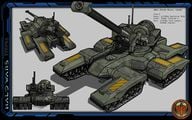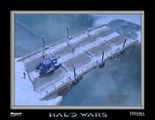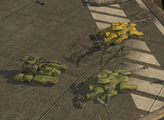M145D Rhino: Difference between revisions
From Halopedia, the Halo wiki
BaconShelf (talk | contribs) |
(Changing the Rhino's date of introduction to 2525, to conform to its appearance in TFoR:AS) |
||
| Line 34: | Line 34: | ||
|consumables= | |consumables= | ||
|othersystems= | |othersystems= | ||
|firstuse=[[ | |firstuse=[[2525]]<ref name="TFoRAS">'''Halo: The Fall of Reach Animated Series'''</ref> | ||
|role=Plasma artillery platform | |role=Plasma artillery platform | ||
|era= [[Human-Covenant War]] | |era= [[Human-Covenant War]] | ||
| Line 44: | Line 44: | ||
==Overview== | ==Overview== | ||
===Development=== | ===Development=== | ||
During the [[Harvest campaign]] the [[Office of Naval Intelligence]] procured large amounts of Covenant matériel in the hope of reverse-engineering it. These efforts yielded varied results, one of the most substantial being the [[Zeus 320mm plasma cannon|''Zeus'' 320mm cannon]], which, like most Covenant weapons, is capable of focusing and directing plasma as a projectile.<ref name="EVG"/> [[Chalybs Defense Solutions]], the creators of the [[M808 Scorpion]] and [[M850 Grizzly]] main battle tanks, was contracted to manufacture the M145D Rhino as a platform for the weapon.<ref name="EVG"/><ref group="note">The "D" in the Rhino's designation suggests that it is the fifth version of the M145. In the opening cutscene of the level ''Dome of Light'', [[Ellen Anders|Professor Anders]] refers to the vehicles as "plasma- | During the [[Harvest campaign]] the [[Office of Naval Intelligence]] procured large amounts of Covenant matériel in the hope of reverse-engineering it. These efforts yielded varied results, one of the most substantial being the [[Zeus 320mm plasma cannon|''Zeus'' 320mm cannon]], which, like most Covenant weapons, is capable of focusing and directing plasma as a projectile.<ref name="EVG"/> [[Chalybs Defense Solutions]], the creators of the [[M808 Scorpion]] and [[M850 Grizzly]] main battle tanks, was contracted to manufacture the M145D Rhino as a platform for the weapon.<ref name="EVG"/><ref group="note">The "D" in the Rhino's designation suggests that it is the fifth version of the M145. In the opening cutscene of the level ''Dome of Light'', [[Ellen Anders|Professor Anders]] refers to the vehicles as "plasma-based Rhinos". The most straightforward explanation is that is she noting the experimental tanks' armament, suggesting their use in eliminating the shield dome. However, it is also possible that she is differentiating the M145D from previous Rhino models, from which one may infer that the M145D is based on an existing design rather than built specifically for the ''Zeus'' cannon.</ref> | ||
By February of [[2531]], the UNSC was field-testing the Rhinos. Several prototypes were kept on the {{UNSCShip|Pillar of Autumn}}, apparently for this purpose.<ref name="Dome" /> | By February of [[2531]], the UNSC was field-testing the Rhinos. Several prototypes were kept on the {{UNSCShip|Pillar of Autumn}}, apparently for this purpose.<ref name="Dome" /> | ||
| Line 53: | Line 53: | ||
==Operational history== | ==Operational history== | ||
===Human-Covenant war=== | ===Human-Covenant war=== | ||
The | The Rhino first entered service by at least [[2525]], where at least one of these artillery platforms were stationed aboard the {{UNSCShip|Atlas}}.<ref name="TFoRAS"/> On [[2531#February|February 9, 2531]], they participated in the [[Battle for Arcadia|invasion of]] [[Arcadia]]. Prior to their arrival, the Covenant established a large base at a [[Arcadia Forerunner ruins|complex]] of [[Forerunner]] ruins near an [[Arcadia ONI facility|ONI base]], over which they deployed an enormous [[Energy shielding#Covenant|energy shield dome]]. The crew of the {{UNSCShip|Spirit of Fire}}, the only remaining combat-ready UNSC forces in the system, requested several Rhinos from the {{UNSCShip|Pillar of Autumn}}, which had been damaged in the initial stages of the attack. During a costly battle, ''Spirit of Fire''<nowiki>'</nowiki>s [[UNSC Marine Corps|Marine]] complement, aided by a firebase built nearby, worked to escort the Rhinos into position. Professor [[Ellen Anders]] was able to determine that they needed five of them after an attempt to use three in conjunction with one another caused part of the dome to flicker but not fail. Finally, when five Rhinos were used simultaneously on the dome, they overloaded the shield's power supply and caused a section of it to disappear, allowing the ''Spirit of Fire'' to safely use its [[MAC]] guns to take out the shield generators and Covenant air defenses, destroying the dome.<ref name="Dome"/> | ||
Some of these Rhinos were then deployed to the ruins, where the Marines encountered a [[Type-29 Scarab|Scarab excavation platform]] that was still under construction. The remaining Rhinos then assisted in the destruction of the Scarab.<ref name="Scarab"/> The Rhino continued to see impressive use throughout the war, though it was rarely deployed. | Some of these Rhinos were then deployed to the ruins, where the Marines encountered a [[Type-29 Scarab|Scarab excavation platform]] that was still under construction. The remaining Rhinos then assisted in the destruction of the Scarab.<ref name="Scarab"/> The Rhino continued to see impressive use throughout the war, though it was rarely deployed. | ||
Revision as of 05:06, January 8, 2019
The M145D Mobile Artillery Assault Platform (MAAP), commonly known as the Rhino, is an artillery tank used by the United Nations Space Command. It is unique among UNSC vehicles in its armament, a plasma cannon that was reverse-engineered from Covenant technology.[1][2]
Overview
Development
During the Harvest campaign the Office of Naval Intelligence procured large amounts of Covenant matériel in the hope of reverse-engineering it. These efforts yielded varied results, one of the most substantial being the Zeus 320mm cannon, which, like most Covenant weapons, is capable of focusing and directing plasma as a projectile.[1] Chalybs Defense Solutions, the creators of the M808 Scorpion and M850 Grizzly main battle tanks, was contracted to manufacture the M145D Rhino as a platform for the weapon.[1][note 1]
By February of 2531, the UNSC was field-testing the Rhinos. Several prototypes were kept on the UNSC Pillar of Autumn, apparently for this purpose.[3]
Design
The architecture of the M145D is similar to that of the M808B and M850, though it is longer and wider than the former vehicles. This larger chassis is designed to support the vehicle's six-bogey tread configuration, which in turn facilitates a lockdown mode - akin to that of the SP42 Cobra - when the cannon is fired.[1] The tank's middle tread bogeys extend farther outward than the forward bogeys. The rear bogeys lie between the middle ones and jut from the back of the tank's chassis; stabilizer mechanisms are mounted to the rear tracks.[1] The Zeus cannon is mounted to a large turret, akin to that of the Grizzly; the weapon is capable of traversing upward at a roughly forty-five degree angle. As with all plasma-based weapons, the Zeus is potent against energy shielding.[3][4]
Operational history
Human-Covenant war
The Rhino first entered service by at least 2525, where at least one of these artillery platforms were stationed aboard the UNSC Atlas.[5] On February 9, 2531, they participated in the invasion of Arcadia. Prior to their arrival, the Covenant established a large base at a complex of Forerunner ruins near an ONI base, over which they deployed an enormous energy shield dome. The crew of the UNSC Spirit of Fire, the only remaining combat-ready UNSC forces in the system, requested several Rhinos from the UNSC Pillar of Autumn, which had been damaged in the initial stages of the attack. During a costly battle, Spirit of Fire's Marine complement, aided by a firebase built nearby, worked to escort the Rhinos into position. Professor Ellen Anders was able to determine that they needed five of them after an attempt to use three in conjunction with one another caused part of the dome to flicker but not fail. Finally, when five Rhinos were used simultaneously on the dome, they overloaded the shield's power supply and caused a section of it to disappear, allowing the Spirit of Fire to safely use its MAC guns to take out the shield generators and Covenant air defenses, destroying the dome.[3]
Some of these Rhinos were then deployed to the ruins, where the Marines encountered a Scarab excavation platform that was still under construction. The remaining Rhinos then assisted in the destruction of the Scarab.[4] The Rhino continued to see impressive use throughout the war, though it was rarely deployed.
Post-war
Some Rhinos still exist as of 2558, though they have been used sporadically due to insufficient resources and a lack of refinements to the prototype. However, the data gleaned from the Rhino's development and use was later used on other projects. The Rhino initiative has seen renewed interest in development due to the interest of Isaac Richardson, one of the UNSC's top procurement officers.[1][6]
Gameplay
Although the Rhino's firepower is weaker than that of the Scorpion, it has superior armor. A group of these tanks is powerful enough to destroy heavy armor, but the vehicle is intended to play a fire support role alongside a large UNSC force. Its secondary ability deploys it into a 'lockdown' mode like that of the Cobra and the Elephant, giving the Rhino a more powerful attack with increased range.
The Rhino is exclusive to two campaign missions in Halo Wars: Dome of Light and Scarab. Besides its importance to the plot, the Rhino functions almost identically to the Cobra in terms of speed and firepower. The sound effect of its deployed artillery cannon is shared with the Cobra. Preventing all the Rhinos from being destroyed in the level grants the player the Rhino Hugger achievement.
Trivia

|
Browse more images in this article's gallery page. |
- As with most UNSC vehicles, the Rhino is named after an animal.
- The Rhino's turret and gun barrel resemble the turret from the Tiger II heavy tank used by the German Army during World War II. Both are designed based on long range bombardment, with a large caliber cannon to perform that role, and both have heavy armor. The turrets of both vehicles rotate slowly.
- A lightning bolt is painted on the side of the Rhino's turret. This is likely a reference to Zeus, the chief deity of the Greek pantheon, who is the namesake of the Rhino's cannon. Zeus used lightning bolts as weapons and as symbols of his power.
- Like its fellow artillery unit the Cobra, the Rhino's lockdown mode bears striking resemblance to the Terran siege tank from the StarCraft series.
- On the Halo: Spartan Assault level The Mirror Mantle Counter-Assault, what appears to be plasma fire can be seen in the background originating from the UNSC lines and landing near Covenant vehicles. The plasma may be fired by off-screen Rhinos.
Gallery
- Ilmhalowarstheme1MediaBlade.jpg
Early concept art of the Rhino.
- Concept 3.jpg
Concept art depicting a Rhino firing a conventional round.
- Rhinox.jpg
A Rhino in an early build of Halo Wars.
Rhinos and an M808B Scorpion on Arcadia.
A Rhino aboard UNSC Atlas.
List of appearances
- Halo Wars (First appearance)
- Halo: The Fall of Reach - The Animated Series
Note
- ^ The "D" in the Rhino's designation suggests that it is the fifth version of the M145. In the opening cutscene of the level Dome of Light, Professor Anders refers to the vehicles as "plasma-based Rhinos". The most straightforward explanation is that is she noting the experimental tanks' armament, suggesting their use in eliminating the shield dome. However, it is also possible that she is differentiating the M145D from previous Rhino models, from which one may infer that the M145D is based on an existing design rather than built specifically for the Zeus cannon.
Sources
- ^ a b c d e f Cite error: Invalid
<ref>tag; no text was provided for refs namedEVG - ^ Cite error: Invalid
<ref>tag; no text was provided for refs namedGuide - ^ a b c Halo Wars, campaign level Dome of Light
- ^ a b Halo Wars, campaign level Scarab
- ^ Cite error: Invalid
<ref>tag; no text was provided for refs namedTFoRAS - ^ Halo Waypoint: Canon Fodder 4/4/2015: Issue 18 Clarity & Grace






